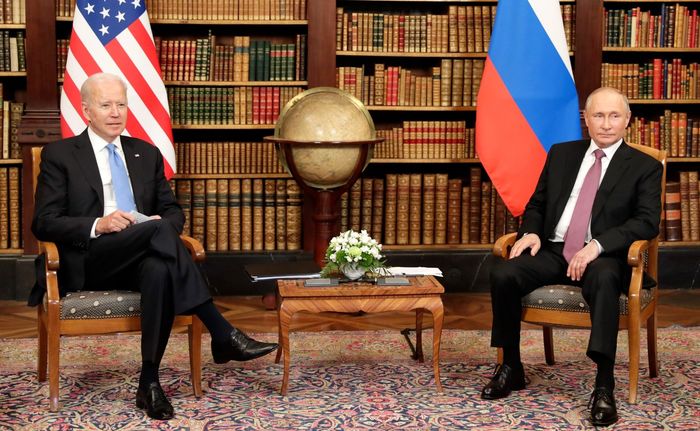The West’s political theatre might be Ukraine’s tragedy
In a response to a recent article by Medhansh Kumar, Krystian Schneyder argues that the tense situation in Ukraine goes beyond great power competition between Russia and the West

The argument put forward by Medhansh Kumar in his article on the situation on Ukraine’s border is an interesting and nuanced one. It is accurate, but also incomplete. He is right in arguing that Russian President Vladimir Putin is likely to score diplomatic points and potentially weaken NATO by escalating the situation. However, what Kumar sees as a diplomatic game between Putin’s Russia and the West is a life or death situation for people in Ukraine. And there are other reasons for treating the 2possibility of conflict more seriously.
“What Kumar sees as a diplomatic game ... is a life or death situation for people in Ukraine”
It is entirely possible that Russia’s recent troop movements are just a show of strength, much like the joint Russia-Belarus ‘Zapad 2021’ training manoeuvres in September 2021. However, to dismiss the possibility of invasion is unwise. Several facts suggest considering the possibility of Russian invasion seriously.
Firstly, Russia’s economic problems do not mitigate against military invasion. On the contrary, Putin has not been afraid to use similar tactics before, like in 2014 when the annexation of Crimea helped boost his domestic popularity. When faced with a deteriorating political situation at home, Putin used the 2014 revolution in Ukraine to his advantage. The resulting annexation of Crimea led to Putin’s approval ratings rising to 89 percent.
Secondly, Ukraine has special significance to Putin’s idea of Russian nationalism. In July 2021 Putin published an article titled ‘On the Historical Unity of Russians and Ukrainians.’ In it he asserts his view that “Russians and Ukrainians are one people”. Putin emphasises the common descent of Russians and Ukrainians and argues that differences between the two peoples are the result of historical and ongoing foreign interference.
Thirdly, Russia has already been covertly involved in the conflict in Ukraine since 2014. Russian-backed separatists in the Donetsk and Luhansk oblasts have been fighting the Ukrainian military; the conflict has claimed an estimated 13,000 lives since April 2014. In July 2014 a Malaysian Airlines flight was shot down over Ukrainian airspace, killing all 298 passengers. A subsequent investigation concluded that the plane was downed by a Buk missile that had come from Russia. In light of this, an escalation of the ongoing conflict, which has developed into a stalemate, would not be unexpected.
Finally, Ukraine has recently been hit by a wave of cyberattacks. Whilst it is not known who is behind these, it is likely that Russia has already begun its campaign against Ukraine. Some have argued that a hybrid war, fought with digital destabilisation and disinformation, is taking place. Others argue for refraining from calling these cyberattacks warfare. Rhetoric aside, with cyberattacks, fake bomb threats, and ongoing conflict in the east, we are faced with a situation that has all the potential to escalate.
“The problem is that, for Putin, increasing tensions over Ukraine is a win-win situation”
By looking at Putin’s previous tactics when responding to domestic problems, as well as at the reality of the Ukrainian conflict, we can draw clearer conclusions about the ongoing crisis. Of course one would be perfectly justified to look at the crisis in the broader context of Joe Biden’s domestic position, Boris Johnson’s scandals, or Olaf Scholz new chancellorship in Germany. However, to draw the conclusion that the Ukraine crisis is a diplomatic game and not a potentially serious military exercise suggests that Russian foreign policy objectives are limited to antagonising the West.
I agree that Russia’s “red line” is that Ukraine should not be allowed to join NATO. However, NATO’s position, stated by its secretary general Jens Stolenberg, that “Ukraine has the right to choose its own security arrangements” is understandable. Any concession to Putin will only embolden him. NATO also has its red lines and Putin understands this. The problem is that, for Putin, increasing tensions over Ukraine is a win-win situation.
If we look at the broader context, we see that Western politicians clearly have the weaker cards compared to Putin. The threat of invasion should therefore be treated seriously. Medhansh Kumar rightly argues that US President Joe Biden’s hard-line approach could strain relations between the US and its European allies. However, a passive or conciliatory approach is not desirable either. However, this is not for the reason Kumar suggests - that it could hurt Biden’s popularity in the US and strengthen a Trump-like demagogue. A passive approach is detrimental because it will encourage Putin to pursue an aggressive foreign policy towards Ukraine.
The reason for Putin’s bold actions is that he knows that no leader in the West will risk war with Russia over Ukraine and that even if Russian troops were to invade, the worst Russia could face is economic sanctions. Therefore, the possibility of conflict between Russia and Ukraine should be treated seriously.
 Features / Should I stay or should I go? Cambridge students and alumni reflect on how their memories stay with them15 December 2025
Features / Should I stay or should I go? Cambridge students and alumni reflect on how their memories stay with them15 December 2025 News / Cambridge study finds students learn better with notes than AI13 December 2025
News / Cambridge study finds students learn better with notes than AI13 December 2025 News / Dons warn PM about Vet School closure16 December 2025
News / Dons warn PM about Vet School closure16 December 2025 News / News In Brief: Michaelmas marriages, monogamous mammals, and messaging manipulation15 December 2025
News / News In Brief: Michaelmas marriages, monogamous mammals, and messaging manipulation15 December 2025 Comment / The magic of an eight-week term15 December 2025
Comment / The magic of an eight-week term15 December 2025









